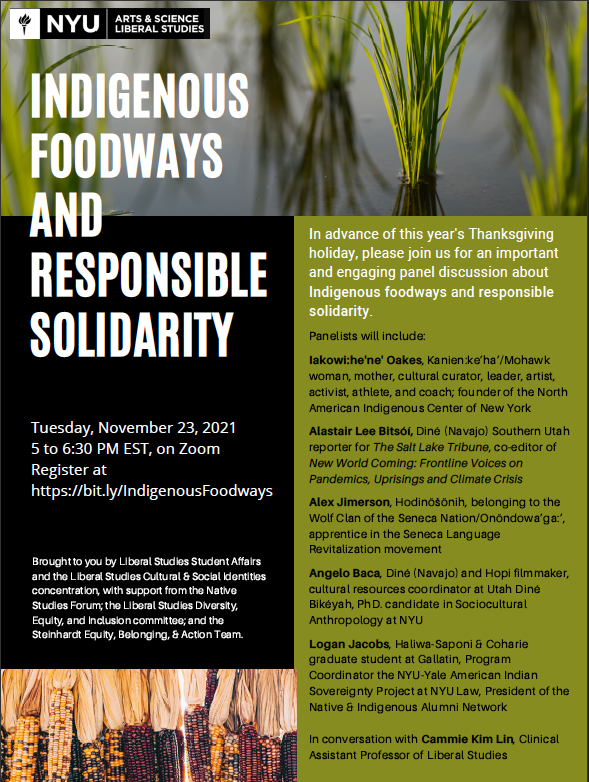Indigeneity & Food
Reclaiming Ancestral Knowledge Towards a Process of Decolonization
Alex Jimerson is a 2018 graduate of the Food Studies program at New York University. He earned is M.A. in Food Studies with a concentration in Food Culture. His academic focus is on Indigenous Foodways and Culture with emphasis on the intersections of hunting and consumption practices between gift economies and market economies.
His recent project involves analysis of hunting practices in particular views on meat consumption in juxtaposition between subsistence cultures and capitalist market societies.
New York University, Master of Arts, Food Studies Graduated May 2018
Academic focus: Indigenous food cultural analysis & Indigenous Food Sovereignty
Syracuse University, Bachelors of Science, Public Health, May 2011
Academic focus: Analyzing health disparities in Native American populations & investigating environmental health assessment regarding utility scale energy projects in relation to Native American health.
Alex Jimerson will be a featured panelist on Indigenous Foodways & Responsible Solidarity
Presented by NYU Liberal Studies Student Affairs and the Liberal Studies Cultural & Social Identities.
Alex Jimerson was a featured panelist on Indigenous & African Foodways.
Co-hosted by Food and Racial Equity (FARE) Collective, Wagner Food Policy Alliance, and Food Studies Graduate Society at New York University.
Why is understanding Indigenous and/or African foodways important? How can we actively work to decolonize the misconceptions people hold?
This conversation will explore the intersections of African and Indigenous foodways and investigate our national narrative around Thanksgiving.
Watch Zoom Recording here: Intersection of Indigenous and African Foodways
Virtual Panelists:
Pysche Williams-Forson PhD
Sherry Pocknett
Yusuf Bin-Rella
Alex Jimerson
Scott Barton (Moderator)
Flyer Design Courtesy of Ikerson Hopper (Onondaga Haudenosaunee)
Video courtesy of Asian/Pacific/American Institute at NYU
Featuring: 1:56:25 - the Sioux Chef Sean Sherman (Oglala Lakota) 10:00 - Ganondagan State Historic Site Manager Peter Jemison (Seneca Haudenosaunee) 47:11 - Brown University Assistant Professor Elizabeth Hoover (Mohawk/Mi’kmaq descendant) 4:48 / 46:12 - NYU PhD Candidate Angelo Baca (Navajo – Hopi) 00:07 - NYU MA Candidate Alex Jimerson (Seneca Haudenosaunee) 1:30:38 - Chef Kini Kahauolopua (Kānaka Maoli)
Convened by Angelo Baca and Alex Jimerson with support from Hi‘ilei Hobart
In 2007, the United Nations Declaration on the Rights of Indigenous Peoples focused, in
part, on guidelines stating that human rights to food is comprised of culturally specific components – that the “cultural acceptability of food is an element of the normative content of the right to food, and is of particular relevance to indigenous peoples.”1 Within this framework, the politics of taste have come to be governed, not by personal preference, but instead by historical processes of territorialism, forced removal, and colonialism. Furthermore, through growing concerns over the age of the anthropocene, lack of access to traditional foods for indigenous people have been compounded with human-generated environmental changes. This symposium will examine the various ways that indigenous communities across the globe have engaged with, adjusted to, resisted, circumvented, and challenged these ruptures to their traditional foodways: from establishing community health centers to native gardens, from settler colonial theory to food studies and cultural history, and from anti-GMO activism to the protection of customary fishing rights.
The resurgence of Indigenous Food Knowledge & Traditional Ecological Knowledge (TEK) will be discussed by the presenting speakers from the intersections of entrepreneurship, activism, community organizing, native farmers and historians, film-makers and academia. The convergence of these fields are growing momentum within indigenous communities.
Photo courtesy of Noel Altaha
Sean Sherman (OGlala Lakota) of the Sioux Chef Company
After an afternoon of presentations and discussions of Indigenous foods our attendees get to taste the Flavors of Manhattan. The Sioux Chef Company served participants: smoked venison, buffalo creek squash, toasted hickory nut pawpaw, nixtamalized red corn, dried rabbit and other foods indigenous to Manhattan.
Photo courtesy of Noel Altaha
Keynote speaker Peter jemison (Haudenosaunee - Seneca)
Showcasing heirloom Iroquois White Corn, an average ear results in over 12 inches long. The Haudenosaunee or People of the longhouse have a long-standing relationship with corn that pre-dates colonial contact. Corn, recognized as one of the Three Sisters is traditionally grown with beans and squash to form a complete protein. Iroquois White Corn and other heirloom varieties are still grown throughout Haudenosaunee communities among growers and seed keepers.







